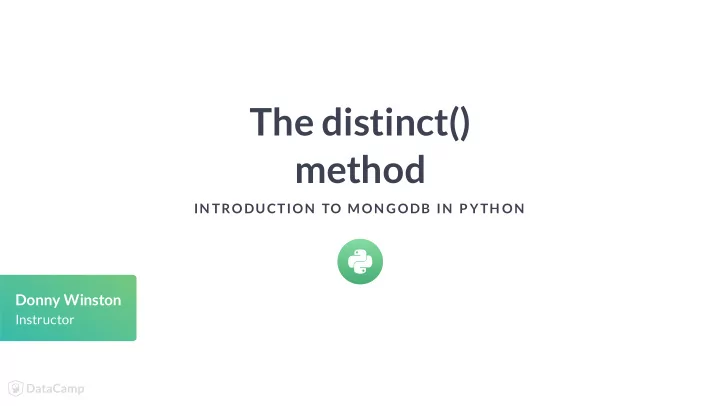

The distinct() method IN TRODUCTION TO MON GODB IN P YTH ON Donny Winston Instructor
An exceptional laureate db.laureates.find_one({"prizes.2": {"$exists": True}}) {'_id': ObjectId('5baacf97f35b632bbe12c1ad'), 'born': '0000-00-00', 'died': '0000-00-00', 'firstname': ('Comité international de la Croix Rouge' '(International Committee of the Red Cross)'), 'gender': 'org', 'id': '482', 'prizes': [{'affiliations': [[]], 'category': 'peace', 'share': '1', 'year': '1917'}, {'affiliations': [[]], 'category': 'peace', 'share': '1', 'year': '1944'}, {'affiliations': [[]], 'category': 'peace', 'share': '2', 'year': '1963'}]} INTRODUCTION TO MONGODB IN PYTHON
Using .distinct() db.laureates.distinct("gender") ['male', 'female', 'org'] A convenience method for a common aggregation (like count_documents ) We will learn how to create custom aggregations in Chapter 4 distinct aggregation is ef�cient if there is a collection index on the �eld We will learn how to create an index in Chapter 3 No index needed here: collection �ts in memory, has ?1,000 documents INTRODUCTION TO MONGODB IN PYTHON
.distinct() with dot notation db.laureates.find_one({"prizes.2": {"$exists": True}}) db.laureates.distinct("prizes.category") {'_id': ObjectId('5baacf97f35b632bbe12c1ad'), ['physics', 'chemistry', 'peace', 'born': '0000-00-00', 'medicine', 'literature', 'economics'] 'died': '0000-00-00', 'firstname': ('Comité international de la Croix Rouge' ['physics', 'chemistry', 'peace', 'medicine', 'literature', 'economi '(International Committee of the Red Cross)'), 'gender': 'org', 'id': '482', 'prizes': [{'affiliations': [[]], 'category': 'peace', 'share': '1', 'year': '1917'}, {'affiliations': [[]], 'category': 'peace', 'share': '1', 'year': '1944'}, {'affiliations': [[]], 'category': 'peace', 'share': '2', 'year': '1963'}]} INTRODUCTION TO MONGODB IN PYTHON
Let's practice! IN TRODUCTION TO MON GODB IN P YTH ON
Pre-�ltering distinct values IN TRODUCTION TO MON GODB IN P YTH ON Donny Winston Instructor
Awards into prize shares db.laureates.find_one({"prizes.share": "4"}) {'bornCountry': 'France', 'died': '1906-04-19', 'diedCountry': 'France',, 'firstname': 'Pierre', 'prizes': [{'affiliations': [{'city': 'Paris', 'country': 'France', 'name': ('École municipale de physique et de chimie' 'industrielles (Municipal School of Industrial' 'Physics and Chemistry)')}], 'motivation': ('"in recognition of the extraordinary' 'services they have rendered by their' 'joint researches on the radiation' 'phenomena discovered by Professor' 'Henri Becquerel"'), 'category': 'physics', 'share': '4', 'year': '1903'}], 'surname': 'Curie', ... } INTRODUCTION TO MONGODB IN PYTHON
High-share prize categories db.laureates.distinct("prizes.category") db.laureates.distinct( "prizes.category", {"prizes.share": '4'}) ['physics', 'chemistry', 'peace', 'medicine', 'literature', 'economics'] ['physics', 'chemistry', 'medicine'] list(db.laureates.find({"prizes.share": "4"})) db.prizes.distinct("category", {"laureates.share": "4"}) [...] ['physics', 'medicine', 'chemistry'] INTRODUCTION TO MONGODB IN PYTHON
Prize categories with multi-winners db.laureates.count_documents({"prizes.1": {"$exists": True}}) 6 db.laureates.distinct( "prizes.category", {"prizes.1": {"$exists": True}}) ['chemistry', 'physics', 'peace'] # We'll learn how to do this in the next chapter: [[{'category': 'physics'}, {'category': 'chemistry'}], [{'category': 'physics'}, {'category': 'physics'}], [{'category': 'chemistry'}, {'category': 'peace'}], [{'category': 'chemistry'}, {'category': 'chemistry'}], [{'category': 'peace'}, {'category': 'peace'}, {'category': 'peace'}], [{'category': 'peace'}, {'category': 'peace'}]] INTRODUCTION TO MONGODB IN PYTHON
Practice time! IN TRODUCTION TO MON GODB IN P YTH ON
Matching array �elds IN TRODUCTION TO MON GODB IN P YTH ON Donny Winston Instructor
Array �elds and equality {'firstname': 'John', 'surname': 'Bardeen', 'prizes': [{ 'category': 'physics', 'year': '1956', 'share': '3', 'motivation': ('"for their researches on semiconductors and their' 'discovery of the transistor effect"'), ... }, { 'category': 'physics', 'year': '1972', 'share': '3', 'motivation': ('"for their jointly developed theory of' 'superconductivity, usually called the BCS-theory"'), ... }], ... } db.laureates.count_documents({"prizes.category": "physics"}) 206 INTRODUCTION TO MONGODB IN PYTHON
Array �elds and equality, simpli�ed # Imaginary extra field in John Bardeen's document: {"nicknames": ["Johnny", "JSwitch", "JB". "Tc Johnny", "Bardy"]} db.laureates.find({"nicknames": "JB"}) # different than {"nicknames": ["JB"]} INTRODUCTION TO MONGODB IN PYTHON
Array �elds and operators db.laureates.count_documents( db.laureates.count_documents({ {"prizes.category": "physics"}) "prizes.category": { "$in": ["physics", "chemistry", "medicine"]}}) 206 596 db.laureates.count_documents( {"prizes.category": {"$ne": "physics"}}) db.laureates.count_documents({ "prizes.category": { "$nin": ["physics", "chemistry", "medicine"]}}) 716 326 326 INTRODUCTION TO MONGODB IN PYTHON
Enter $elemMatch db.laureates.count_documents({ db.laureates.count_documents({ "prizes": { "prizes": {"$elemMatch": "category": "physics", "share": "1"}}) {"category": "physics", "share": "1"}}}) 0 47 db.laureates.count_documents({ db.laureates.count_documents({ "prizes.category": "physics", "prizes.share": "1"}) "prizes": {"$elemMatch": { "category": "physics", "share": "1", 48 "year": {"$lt": "1945"},}}}) 29 29 INTRODUCTION TO MONGODB IN PYTHON
Onward and array- ward! IN TRODUCTION TO MON GODB IN P YTH ON
Distinct As You Like It: Filtering with Regular Expressions IN TRODUCTION TO MON GODB IN P YTH ON Donny Winston Instructor
Finding a substring with $regex db.laureates.find_one({"firstname": "Marie"}) db.laureates.distinct("bornCountry", {"bornCountry": {"$regex": "Poland"}}) {'born': '1867-11-07', 'bornCity': 'Warsaw', ['Russian Empire (now Poland)', 'bornCountry': 'Russian Empire (now Poland)', 'Prussia (now Poland)', 'firstname': 'Marie', 'Germany (now Poland)', 'surname': 'Curie, née Sklodowska', 'Austria-Hungary (now Poland)', ...} 'German-occupied Poland (now Poland)', 'Poland', 'Poland (now Ukraine)', 'Poland (now Lithuania)', 'Poland (now Belarus)', 'Free City of Danzig (now Poland)'] INTRODUCTION TO MONGODB IN PYTHON
Flag options for regular expressions case_sensitive = db.laureates.distinct( import re "bornCountry", {"bornCountry": {"$regex": "Poland"}}) db.laureates.distinct("bornCountry", {"bornCountry": re.compile("poland", re.I)}) case_insensitive = db.laureates.distinct( "bornCountry", ['Russian Empire (now Poland)', ...] {"bornCountry": {"$regex": "poland", "$options": "i"}}) assert set(case_sensitive) == set(case_insensitive) from bson.regex import Regex db.laureates.distinct("bornCountry", {"bornCountry": Regex("poland", "i")}) ['Russian Empire (now Poland)', ...] INTRODUCTION TO MONGODB IN PYTHON
Beginning and ending (and escaping) from bson.regex import Regex db.laureates.distinct( "bornCountry", db.laureates.distinct("bornCountry", {"bornCountry": Regex("now Poland\)$")}) {"bornCountry": Regex("^Poland")}) ['Russian Empire (now Poland)', ['Poland', 'Prussia (now Poland)', 'Poland (now Ukraine)', 'Germany (now Poland)', 'Poland (now Lithuania)', 'Austria-Hungary (now Poland)', 'Poland (now Belarus)'] 'German-occupied Poland (now Poland)', 'Free City of Danzig (now Poland)'] db.laureates.distinct( "bornCountry", {"bornCountry": Regex("^Poland \(now")}) ['Poland (now Ukraine)', 'Poland (now Lithuania)', 'Poland (now Belarus)'] INTRODUCTION TO MONGODB IN PYTHON
Let's practice! IN TRODUCTION TO MON GODB IN P YTH ON
Recommend
More recommend